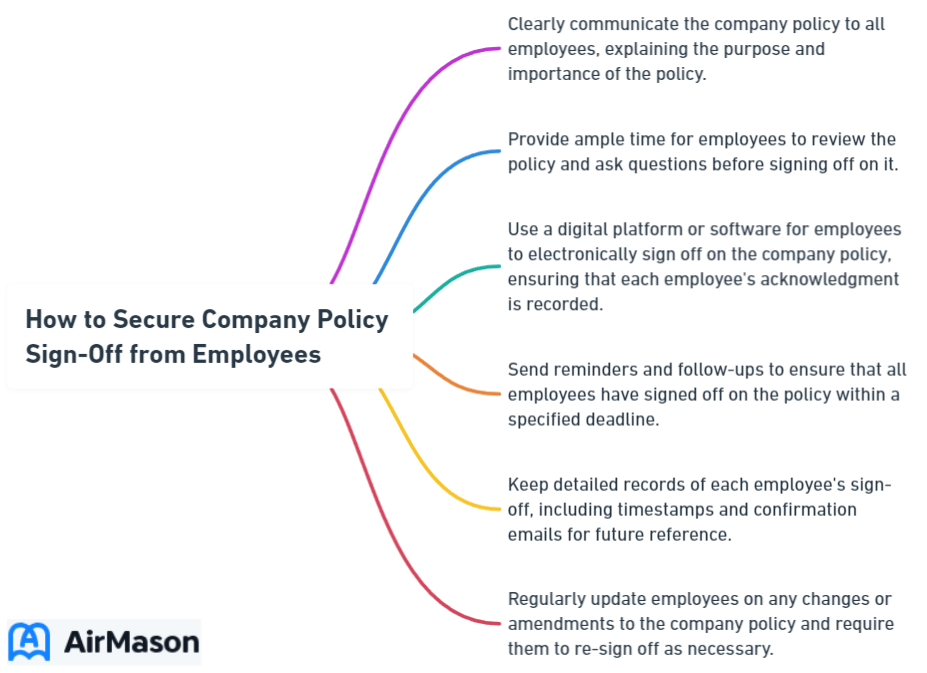
In today’s fast-paced business environment, ensuring your employees are well-informed and in compliance with company policies is more critical than ever. A signed agreement between an employee and employer can provide a solid foundation for a successful working relationship. But how can you effectively secure company policy sign-off from employees and avoid potential legal pitfalls along the way? This blog post will provide a comprehensive guide to streamlining this process, keeping your company on track and your employees engaged and committed.
From creating an effective employee handbook to implementing digital signatures and consulting legal and HR professionals, we’ll walk you through the steps necessary to ensure your company policies are acknowledged, understood, and adhered to in 2024. Let’s dive in!
Key Takeaways
- Signing-off on company policies is essential to set clear expectations, secure adherence and reduce legal liability.
- Digital signatures provide improved efficiency, security and cost savings for policy acknowledgment processes.
- Consulting with legal & HR professionals is recommended when developing an effective system for record keeping & ensuring accessibility & compliance.

The Importance of Employee Sign-Off on Company Policies
When employees sign-off on company policies, it helps in setting clear expectations, securing adherence, and curtailing potential legal liability, especially during the signing of employee handbooks. Employees’ signatures on these documents signify their comprehension of the company’s expectations and their contractual obligation to abide by conduct policies. In essence, a signed company policy serves as a legally binding agreement between the employee and the employer, providing a clear point of reference for both parties.
Moreover, signed policies can help reinforce a company’s culture and values, fostering a positive work environment that promotes compliance and understanding. Obtaining employee signatures allows employers to verify their team members’ awareness of the organization’s policies and procedures, thus diminishing non-compliance risk and reinforcing daily company operations.
Legal Implications of Signed Policies
Having signed policies in place carries significant legal implications, providing safeguard for both employers and employees. This includes matters related to vacation days, benefits, and other aspects of the employer-employee relationship. The enforceability of signed policies is contingent upon the particular policies and the jurisdiction in which they are implemented, which employers need to address when drafting policies.
Creating policies that align with pertinent laws and regulations is key to making them legally binding. This way, companies can confirm that their policies are enforceable, comply with related contractual obligations, and reduce legal risks along with potential disagreements.

Reinforcing Company Culture and Values
Establishing clear rules and expectations is vital for reinforcing a company’s culture and values. When employees sign company policies, it assures employers that their team aligns with the organization’s mission, vision, and values, thus fostering a productive and cohesive work environment.
Signed policies offer a range of advantages to organizations, including:
- Clarity and consistency
- Legal protection
- Accountability
- Communication and awareness
- Employee alignment
- Compliance and risk management
- Employee protection
Securing employee sign-off on company policies aids employers in nurturing a positive work culture, which, in turn, contributes to the organization’s overall success, especially for new hires.
Creating an Effective Employee Handbook
A well-crafted employee handbook is key to providing employees with the necessary information regarding conduct policies, procedures, and expectations. It is important to include legally-mandated language in the handbook, such as the “at will” acknowledgment, to avoid inadvertently creating an employment contract, which could make it difficult to terminate an employee without cause.
For your employee handbook to be effective, you need to establish a protocol for distributing modifications and obtaining employees’ written confirmation on the updates. This not only helps maintain the currency of the handbook, but also ensures that employees are aware of any changes in company policies, ultimately promoting compliance and understanding within the workplace.
Read our article on effective employee immigration laws for handbook if you are looking to hire international talent.
Content and Organization
An effective employee handbook should detail the company’s regulations and protocols, as well as the rights and obligations of employees. It serves as a guide for both employers and employees, ensuring that everyone is aware of the expectations and adheres to applicable laws and regulations.
While drafting an employee handbook, it’s necessary to make it comprehensive, up-to-date, and compliant with local labor laws and regulations. To create a comprehensive and organized employee handbook, it is prudent to consult with legal professionals to ensure that the handbook is tailored to the company’s specific requirements. They can provide invaluable insight into the particular requirements of the company’s sector, size, and location, helping to ensure the handbook is both effective and legally compliant.

Regular Updates and Revisions
Regular updates and revisions to the employee handbook are vital for several reasons, including:
- Ensuring adherence to employment laws
- Boosting clarity and alignment
- Promoting communication and transparency
- Mitigating legal risks
- Empowering employees
- Adapting to evolving needs
- Maintaining consistency
- Enhancing employee engagement.
To ensure successful implementation of regular updates and revisions to the employee handbook, it is imperative to document the process, inform employees of any changes, and keep the handbook up-to-date. Additionally, it is essential to make the handbook accessible to all employees and to ensure compliance with applicable laws and regulations.
Implementing Digital Signatures for Policy Acknowledgment
Digital signatures have become an increasingly popular method for acknowledging company policies due to their secure and reliable means of authentication and validation. Implementing digital signatures allows employers to customize and schedule the policy process, guaranteeing that the right individuals receive the correct acknowledgment form when they should.
The procedure for instituting digital signatures for policy acknowledgment involves the following steps:
- Select an appropriate digital signature platform.
- Configure the platform according to your organization’s needs.
- Instruct personnel on how to utilize the platform effectively.
Streamlining this process helps employers reduce the risk of non-compliance and make the policy acknowledgment process more efficient.
Benefits of Digital Signatures
Digital signatures offer numerous advantages, such as increased efficiency, accessibility, and security. These signatures provide improved efficiency, cost savings, simplified processes, and the ability to sign documents remotely.
In terms of accessibility, digital signatures provide an enhanced audit trail, enable remote signing, and offer environmental benefits. In addition to these advantages, digital signatures provide increased security and legal legitimacy. Utilizing digital signatures enables employers to secure a reliable and regulation-compliant policy acknowledgment process.

Selecting the Right Digital Signature Platform
Choosing the right digital signature platform is crucial for ensuring the safety and reliability of your policy acknowledgment process. A suitable platform should include the following features:
- Authentication
- Encryption
- Document management
- Workflow automation
- Audit trail
- Integration
- Compliance
- Mobile support
- Multiple signer support
- Customization
Authentication and encryption are paramount in guaranteeing the security of the digital signature platform and the documents that are signed. Additionally, document management and workflow automation can facilitate the signing process, ensuring that all documents are securely stored and monitored, ultimately reducing the likelihood of errors and saving time.
Handling Employee Refusal to Sign Policies
Securing employee sign-off on company policies is vital, but employers may occasionally encounter challenges when an employee resists signing. In such cases, it is important to understand the potential ramifications of refusal, which may include:
- disciplinary action
- forfeiture of privileges
- legal implications
- harm to professional reputation
- restricted career progression opportunities
Employers can address employee refusal to sign by having the employee inscribe “refuse to sign” in lieu of signing the handbook or having a representative inscribe “employee refused to sign an acknowledgment”. This approach allows employers to keep a record of the employee’s refusal to sign, thereby reducing potential legal complications.
Communicating the Importance of Policy Sign-Off
Clear communication about the importance of policy sign-off is essential to ensure understanding and compliance among employees. Signed policies serve as a formal recognition and agreement between the employee and the company, setting forth precise expectations and directives for behavior and conduct. Policy sign-off helps to reduce risks, foster uniformity, and maintain a secure and productive work environment.
Highlighting the legal ramifications of signed policies, like protecting the company from legal accountability during conflicts, can motivate employees to be serious about the policy acknowledgment process. In addition, utilizing digital signatures for policy acknowledgment can further streamline and secure the process, making it more appealing for employees to acknowledge and engage in.

Managing Consequences of Refusal
When faced with an employee’s refusal to sign policies, it is essential for employers to consider the potential implications and develop strategies for managing these situations effectively. The employer may interpret the refusal to sign as a negative indication of how the employee may conduct themselves or integrate into the company, thus they may opt not to employ the individual.
To tackle the fallout from employee refusal to sign policies, employers might consider:
- Enforcing a clear policy that delineates the consequences of refusal
- Allowing employees to express any concerns they might have
- Ensuring that all policies are communicated clearly and regularly
- Giving employees the opportunity to ask questions and provide feedback
Tracking and Maintaining Policy Acknowledgment Records
Keeping track of and maintaining policy acknowledgment records is indispensable for confirming employees’ awareness and adherence to company policies, and for shielding employers from potential legal issues stemming from employee non-compliance. By keeping these records up-to-date and accessible, employers can promote a culture of accountability and transparency within the organization.
To efficiently track and maintain policy acknowledgment records, organizations should consider implementing a digital signature platform to facilitate the process. This platform enables employees to sign documents electronically, eliminating the need for paper-based processes. Additionally, organizations should ensure that policy acknowledgment records are securely stored and readily accessible when required, helping to maintain a compliant and well-informed workforce.
Developing a System for Record-Keeping
When devising a system for tracking policy acknowledgments, you need to consider factors like the types of records to be kept, the business size, and the available budget. Utilizing a digital system, such as a cloud-based system, can provide convenient access and secure storage for these records.
For successful implementation of record-keeping practices, it’s crucial to train staff on system usage, set reminders for record maintenance, and regularly audit the system to confirm its appropriate use. Additionally, taking measures to guarantee data security and privacy is paramount when creating a record-keeping system.
Ensuring Accessibility and Compliance
Ensuring accessibility and compliance in monitoring policy acknowledgment records is vital for reasons like making sure all employees, inclusive of those with disabilities, can access and understand the policy acknowledgment process, and confirming the process aligns with relevant regulations.
To ensure accessibility and compliance when monitoring policy acknowledgment records, organizations should:
- Utilize a digital platform or software that is accessible to all employees, including those with disabilities
- Provide clear communication of the policy acknowledgment process
- Provide instructions in multiple formats to guarantee that all employees are informed and able to participate in the process.
Consulting Legal and HR Professionals for Policy Development
It’s beneficial to consult with legal and HR professionals when developing company policies and employee handbooks to guarantee compliance and avoid potential legal problems. These professionals can offer invaluable insight into the legal ramifications of company policies and help employers create policies that are compliant with applicable laws and regulations.
Through the expertise of legal and HR professionals, employers can ensure their policies are legally compliant and serve the interests of both the company and its employees. This collaboration can help foster a workplace environment that promotes compliance, understanding, and overall success.
Legal Expertise in Policy Creation
Legal expertise is of paramount importance in policy formation for several reasons, including:
- Ensuring compliance with laws and regulations
- Safeguarding rights and interests
- Minimizing legal disputes
- Guaranteeing effective enforcement and implementation
- Accommodating the changing legal landscape.
With legal counsel during policy formation, employers can ensure compliance with laws and regulations, protect the rights and interests of the company and its employees, mitigate legal disputes, and facilitate effective enforcement and implementation of policies. Additionally, legal counsel can assist companies in adapting to evolving legal landscapes, ensuring policies remain up-to-date and compliant with current regulations.
HR Professionals’ Role in Policy Implementation
HR professionals are integral to the implementation of company policies. They are responsible for:
- Formulating and communicating policies to employees
- Validating compliance with applicable laws and regulations
- Monitoring policy adherence
- Providing support and guidance to supervisors and personnel to understand and implement policies effectively
- Organizing training sessions
- Generating policy documentation
- Managing any policy-related issues or disagreements that arise.
By taking a proactive approach to policy implementation, HR professionals can help ensure that employees are well-informed and committed to adhering to company policies and procedures. Their expertise and guidance can contribute to a more cohesive and compliant workforce, ultimately benefiting the overall success of the organization.
Summary
In conclusion, securing company policy sign-off from employees is an essential aspect of maintaining a compliant and successful organization. By following the steps outlined in this blog post, employers can effectively create employee handbooks, implement digital signatures, manage policy acknowledgment records, and consult with legal and HR professionals to ensure that their policies are legally compliant and well-understood by all employees.
By taking a proactive approach to policy acknowledgment and fostering a culture of compliance and understanding, employers can create a workplace environment that promotes productivity, minimizes legal risks, and ultimately contributes to the overall success of the organization.
Frequently Asked Questions
Do you have to sign a company policy?
Signing a company policy is not required by law, but may be necessary to make it binding if it is a material term.
However, it is important to note that signing a policy does not guarantee that it will be legally binding. It is important to consult with a lawyer to ensure that the policy meets all legal requirements.
Do company policies have to be in writing?
Having policies in writing is important for businesses to protect their interests, demonstrate nondiscriminatory employment practices, and help employees know their rights and responsibilities.
It serves as a useful resource and can help provide an effective defense against employee lawsuits.
How do you get employees to read policies?
Encourage engagement with policies and procedures through competition, gamification, changing language, decorative visuals, and making them memorable.
This will motivate employees to read policies more actively and remember them.
What is a company policy?
Company policies are written guidelines that outline the practices and procedures of a business to ensure employees adhere to the company’s values and goals. They provide a set of internal rules, expectations, and behaviors for employees to follow. Some examples of company policies include, code of conduct, anti-harassment policy, workplace safety, data security, attendance, equal employment opportunity, etc.
These policies are important for businesses to maintain a consistent level of quality and service, as well as to protect the company from legal issues. They also help to ensure that employees are aware of their rights and responsibilities.
What happens if an employee refuses to sign a policy?
If an employee refuses to sign a policy, they can still be issued a copy of the handbook and informed that all policies within it apply.
An HR representative can note their refusal on the form.